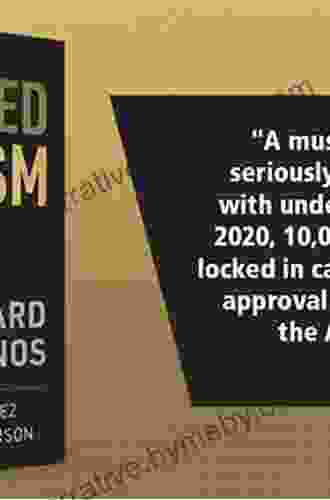Igniting a Conversation: Recognizing the Hidden Venom of White Animus Toward Latinos

: Unveiling a Hidden Truth
In an era marked by heightened social consciousness, it is imperative to confront the uncomfortable truths that continue to plague our societies. One such truth is the insidious presence of white animus toward Latinos – a pervasive form of racism that has long been ignored or downplayed. In her groundbreaking book, "Ignored Racism: White Animus Toward Latinos," renowned scholar Edna Bonilla-Silva exposes this hidden venom, shedding critical light on its pernicious effects.
4.6 out of 5
| Language | : | English |
| File size | : | 1911 KB |
| Text-to-Speech | : | Enabled |
| Screen Reader | : | Supported |
| Enhanced typesetting | : | Enabled |
| Word Wise | : | Enabled |
| Print length | : | 236 pages |
Through meticulous research and analysis, Bonilla-Silva unravels the complex tapestry of white animus, revealing its deep-rooted origins in colonial history and its enduring impact on the lives of Latinos in the United States. This article delves into the key insights of her work, exploring the manifestations, consequences, and implications of white animus for both individuals and society as a whole.
Manifestations of White Animus
White animus, as defined by Bonilla-Silva, encompasses a range of attitudes and behaviors that perpetuate racial prejudice and discrimination against Latinos. It manifests in both overt and covert forms, often taking on a subtle and insidious nature.
- Explicit racism: This form is characterized by blatant expressions of racial superiority, such as hate speech, slurs, and violence. While overt racism has diminished in recent years, it remains a persistent problem in certain sectors of society.
- Aversive racism: More prevalent today, aversive racism involves subtly negative attitudes toward Latinos that may not be consciously recognized or acknowledged. It manifests in avoidance behaviors, microaggressions, and stereotypes that perpetuate the idea of Latinos as inferior.
- Color-blind racism: This insidious form of racism denies the existence of racial inequalities and argues that all individuals are treated equally regardless of race. By ignoring the systemic barriers faced by Latinos, color-blind racism perpetuates the status quo and maintains white privilege.
Consequences of White Animus
The consequences of white animus for Latinos are profound and far-reaching. It negatively impacts their physical and mental health, educational opportunities, economic prospects, and overall well-being. Bonilla-Silva demonstrates how white animus:
- Increases stress and anxiety: The constant fear of discrimination and mistreatment takes a toll on the mental health of Latinos, leading to heightened levels of stress, anxiety, and depression.
- Limits educational attainment: Racial bias in schools, such as tracking and unequal access to resources, contributes to lower educational outcomes for Latino students, hindering their future opportunities.
- Restricts economic mobility: Labor market discrimination, racial profiling, and wage disparities perpetuate economic inequalities for Latinos, limiting their ability to advance financially.
- Undermines social inclusion: White animus creates a hostile and unwelcoming environment for Latinos, isolating them from mainstream society and exacerbating feelings of marginalization.
Implications for Society
The presence of white animus is not only detrimental to Latinos but also has broader implications for society as a whole. It undermines the principles of equality and justice that are foundational to a democratic society. Bonilla-Silva argues that:
- It erodes trust: White animus breeds distrust between Latinos and white Americans, making it difficult to build bridges and foster genuine reconciliation.
- It perpetuates inequality: By limiting the opportunities and potential of Latinos, white animus contributes to a perpetuation of racial inequality, which has negative consequences for all members of society.
- It undermines national unity: The exclusion and marginalization of Latinos weaken the social fabric of the United States and hinder its ability to fully harness the contributions of its diverse population.
Challenging White Animus
Recognizing and confronting white animus is a crucial step toward creating a more just and equitable society. Bonilla-Silva's work provides invaluable insights into this insidious form of racism, but it also offers a path toward progress.
To challenge white animus, we must:
- Educate ourselves: Understand the history, manifestations, and consequences of white animus, and actively seek out perspectives that challenge our own assumptions.
- Confront our own biases: Be honest about our own racial attitudes and behaviors, and actively work to overcome any prejudices or stereotypes we may hold.
- Build alliances: Foster meaningful connections and alliances with Latinos and other marginalized groups to build trust and understanding.
- Advocate for change: Support policies and initiatives that promote racial equity and inclusion, and hold institutions accountable for addressing systemic racism.
: A Call to Action
"Ignored Racism: White Animus Toward Latinos" is a groundbreaking work that shines a light on a pervasive yet under-recognized issue. By exposing the insidious nature of white animus, Edna Bonilla-Silva challenges us to confront our own biases and work toward a more just and equitable society for all.
It is our collective responsibility to dismantle the barriers that have historically excluded and marginalized Latinos. Through education, self-reflection, alliance-building, and advocacy, we can create a society that truly values diversity and embraces the contributions of all its members.
Igniting a conversation about white animus is not easy, but it is essential. Because in the words of Bonilla-Silva, "Silence is not an option when human dignity is at stake."
4.6 out of 5
| Language | : | English |
| File size | : | 1911 KB |
| Text-to-Speech | : | Enabled |
| Screen Reader | : | Supported |
| Enhanced typesetting | : | Enabled |
| Word Wise | : | Enabled |
| Print length | : | 236 pages |
Do you want to contribute by writing guest posts on this blog?
Please contact us and send us a resume of previous articles that you have written.
 Book
Book Novel
Novel Page
Page Chapter
Chapter Text
Text Story
Story Genre
Genre Reader
Reader Library
Library Paperback
Paperback E-book
E-book Magazine
Magazine Newspaper
Newspaper Paragraph
Paragraph Sentence
Sentence Bookmark
Bookmark Shelf
Shelf Glossary
Glossary Bibliography
Bibliography Foreword
Foreword Preface
Preface Synopsis
Synopsis Annotation
Annotation Footnote
Footnote Manuscript
Manuscript Scroll
Scroll Codex
Codex Tome
Tome Bestseller
Bestseller Classics
Classics Library card
Library card Narrative
Narrative Biography
Biography Autobiography
Autobiography Memoir
Memoir Reference
Reference Encyclopedia
Encyclopedia Ashlee Lewis
Ashlee Lewis Robert Glazer
Robert Glazer Giuseppe Cristiano
Giuseppe Cristiano Ashley Strickland Freeman
Ashley Strickland Freeman Britt Hawthorne
Britt Hawthorne Henry Koster
Henry Koster Asker Jeukendrup
Asker Jeukendrup R B Marshall
R B Marshall Bassem R Mahafza
Bassem R Mahafza Patricia Bell Scott
Patricia Bell Scott Marcella Denise Spencer
Marcella Denise Spencer Shana Alexander
Shana Alexander Babu The Panda
Babu The Panda Crystal L Lake
Crystal L Lake B B Thatcher
B B Thatcher Audrey Salkeld
Audrey Salkeld B T Polcari
B T Polcari Sigrid Fry Revere
Sigrid Fry Revere Audrey Peterman
Audrey Peterman Barbara A Somervill
Barbara A Somervill
Light bulbAdvertise smarter! Our strategic ad space ensures maximum exposure. Reserve your spot today!
 Chadwick PowellFollow ·5.3k
Chadwick PowellFollow ·5.3k Vince HayesFollow ·17k
Vince HayesFollow ·17k Don ColemanFollow ·8.3k
Don ColemanFollow ·8.3k Marc FosterFollow ·8.3k
Marc FosterFollow ·8.3k Howard PowellFollow ·17.3k
Howard PowellFollow ·17.3k Jayden CoxFollow ·15.4k
Jayden CoxFollow ·15.4k Jesus MitchellFollow ·5k
Jesus MitchellFollow ·5k George OrwellFollow ·8.1k
George OrwellFollow ·8.1k

 Ian McEwan
Ian McEwanWhy Didn't Anyone Say Anything? Uncovering the Hidden...
By [Author's...

 William Wordsworth
William WordsworthArthurian Legendarians: Faithless One - Part One – A...
In the realm of legendary tales, the...

 Corey Hayes
Corey HayesSSAT ISEE Prep Test: Arithmetic Review Flash Cards Cram...
Are you preparing for the SSAT or ISEE exam?...

 Robert Louis Stevenson
Robert Louis StevensonUnveiling the Essential Guide to Compliance: BCBS 239...
In the ever-evolving...

 Javier Bell
Javier BellJust Peachy: A Tale of Sweetness and Sassiness
Immerse yourself in a...

 Brent Foster
Brent FosterStep-by-Step Instruction Manual to Building a Real Estate...
Are you eager to embark on the...
4.6 out of 5
| Language | : | English |
| File size | : | 1911 KB |
| Text-to-Speech | : | Enabled |
| Screen Reader | : | Supported |
| Enhanced typesetting | : | Enabled |
| Word Wise | : | Enabled |
| Print length | : | 236 pages |











